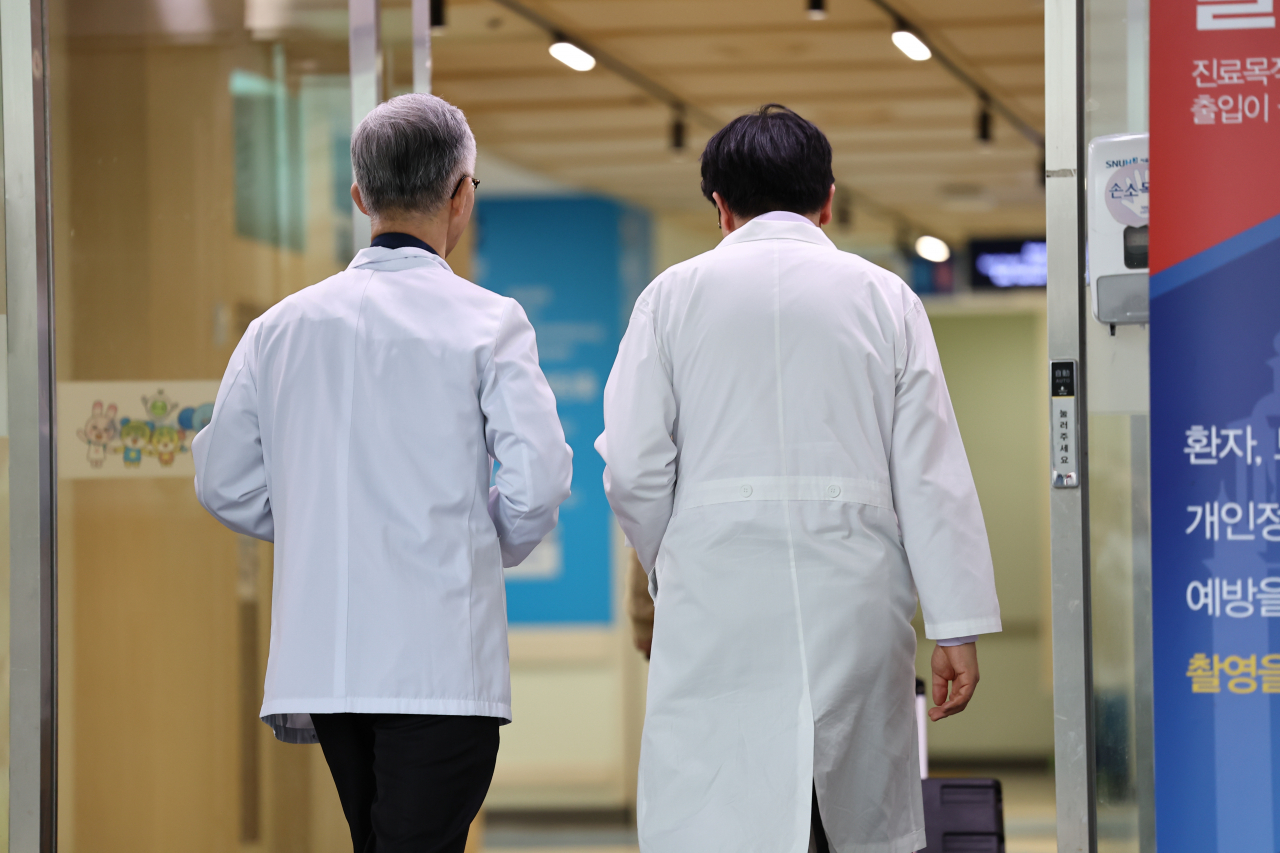 |
Professors of Seoul National University Hospital enter a building of the hospital in Seoul on Tuesday. (Yonhap) |
Medical professors at major hospitals in South Korea will resign later this week and have a day off next week as they have been thinly stretched amid a prolonged walkout by trainee doctors, officials said Tuesday, deepening concerns over further disruptions in the country's health care system.
"We confirm our resignation will start from April 25 as planned," an emergency committee of national medical professors said after an online general meeting. "We will go ahead without the government's policies to accept our resignation."
The committee consists of professors from 20 medical schools nationwide, including Seoul National University, Yonsei University and the University of Ulsan.
It said professors will have a day off next week as their fatigue reached the utmost limit.
Plans to have weekly breaks on a regular basis will be discussed at another general meeting, the committee said.
Earlier in the day, medical professors from some hospitals also announced their plans to step down and have a weekly day off from next week.
"We have decided to shut down once a week from April 30," said an emergency committee of professors of SNU College of Medicine and SNU Hospital after a general meeting.
Professors from Asan Medical Center and University of Ulsan College of Medicine said they will resign from Thursday, while those who cannot leave the hospital immediately will have a day off every week from May 3.
"Due to the mental and physical limitations of professors in a prolonged emergency medical situation, we have no choice but to reschedule clinics and surgeries," they said.
They will suspend all surgeries and treatment for outpatients once a week and details, including when to begin the move, are expected to be decided in accordance with the situations of each hospital, they added.
The decision came as about 12,000 trainee doctors have left their worksites since Feb. 20 in protest of the government's plan to boost the number of medical students, forcing major hospitals to delay or cancel surgeries and other public health services. In support of the walkout by junior doctors, medical professors submitted their resignations.
The move is also seen as a way of adding pressure by the medical community on the government to seek a breakthrough as the plan on the medical school admission quota for next year is supposed to be finalized by end-April.
Some hospitals, including Chungnam National University Hospital in the central city of Daejeon, have already decided not to provide service for outpatients on Fridays starting this week, and many other hospitals are feared to follow suit.
Medical school professors at SNU will review the option during a meeting slated for Tuesday.
Earlier in the day, Second Vice Health Minister Park Min-soo called for doctors to stop collective action on the planned leave of tired medical school professors.
"The medical community should stop collective action and join a special commission on medical reform set to be launched this week for productive discussions," Park told a government response meeting.
Under the envisioned presidential commission, officials from the health ministry and other relevant ministries, as well as some 20 experts, will discuss how to reform the country's medical system, including the possible adjustment of medical school admissions and ways of raising investment in essential medical fields.
But the Korea Medical Association and the Korea Intern Resident Association have vowed to boycott the initiative.
Upping the ante, medical professors were considering taking a day off every week as they have been stretched thin amid the prolonged walkout by trainee doctors.
The emergency committee for national medical professors will hold a general meeting later in the day and discuss the potential suspension of all surgeries and treatment for outpatients once a week, according to its officials.
Details, including when to begin the move, are expected to be decided in accordance with the situations of each hospital, though they are likely to continue operations of their emergency rooms and intensive care units, they added.
Adding to the woes is that medical professors began submitting their resignations on March 25, and the resignations could take legal effect after the elapse of one month even without approval from their employers.
The education ministry has said "not many" professors have tendered resignations, and no resignations have been accepted so far.
The government has proposed dialogue by setting up a special presidential commission on medical reform, while allowing universities to decide their quotas by a range of 50 to 100 percent of what the government assigned for next year.
But doctors have rejected the proposals, calling for the government to revisit the issue from scratch.
The government has stressed the need to increase the medical school admission quota to address a shortage of doctors, particularly in rural areas and essential medical fields.
Given South Korea's rapid population aging and other issues, the country is expected to fall short by 15,000 doctors by 2035, according to the health ministry.
Doctors, however, have said that the quota hike would compromise the quality of medical education and services and create a surplus of physicians, and the government must devise ways of encouraging more physicians to practice in such "unpopular" fields as high-risk surgeries, pediatrics, obstetrics and emergency medicine. (Yonhap)







